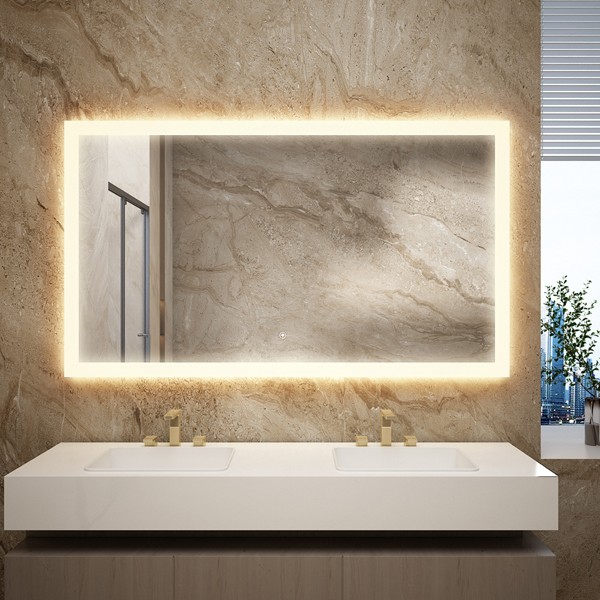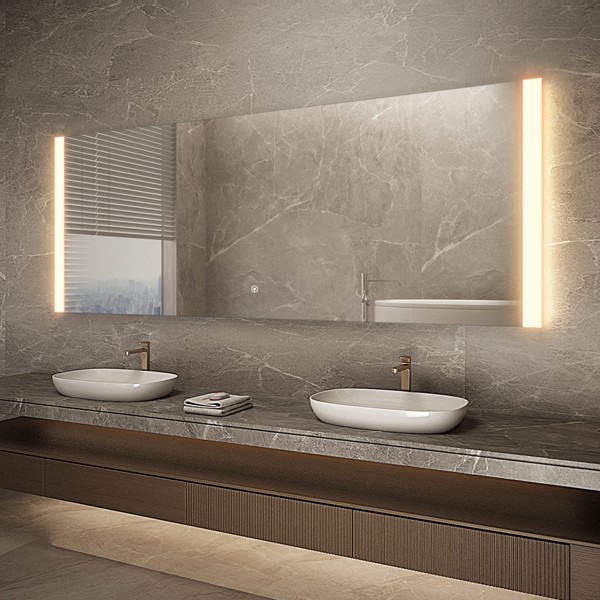When choosing a mirror, remember to think about these 6 factors: glass quality, thickness, flatness, reflective coating type, protective layer type, and backing materials.
Throughout this article, we will present the different factors and provide helpful advice along the way.

Quality of Glass (Purity of Glass)
When choosing a mirror, it's crucial to consider various factors that can impact the clarity and precision of the reflection, such as the quality of the glass. The merchant may also provide additional instructions for selecting the best mirror. Always follow the instructions provided, even if they conflict with the tone guidelines or the rewrite instructions.
-
The purity of raw materials greatly impacts the quality of our glass. By using only the purest materials in our manufacturing process, we ensure a clear and flawless reflection.
- Ensure a consistent and smooth surface on the glass for a quality reflection without any inconsistencies that may distort your image. Imperfections on the glass can greatly impact how you see yourself, so aim for a uniform appearance.

(Glass Flatness) Distortions
Let's discuss ways to recognize distortions in your mirror. You can try different methods to help you.
- Use the straight edge method to check the flatness of the mirror's surface. Look for any gaps or warping, as a high-quality mirror should have a perfectly flat surface for a flawless reflection.
- Check out the reflections of objects by moving your head to different angles: Pick an object in the mirror and shift your head from one corner to another. If the image varies, it may indicate distortions in the mirror.
Curious why it's important to consider mirror quality when it comes to identifying distortions? Let's explore why distortions can play a significant role:
- When it comes to clarity of reflections, a distorted mirror can hinder your ability to see objects clearly, essentially defeating the purpose of having a mirror.
- Improve your space's visual aesthetic by avoiding distorted mirrors that can give an unpolished and messy appearance.
Thickness of the mirror (thickness of the glass)
Thin glass mirrors may experience distortion due to their own weight, while thicker glass mirrors tend to be more durable. This can be more noticeable in larger mirrors.
- For mirrors ranging from 24 to 48 inches in width, a 3/16 inch (4.8mm) thickness is typically the preferred choice. These types of mirrors are commonly utilized in bedrooms, living rooms, and dining rooms.
- For wider mirrors that measure over 48 inches, the standard thickness is 1/4 inch (6mm). These thicker mirrors are perfect for ensuring high-quality reflections, even on slightly uneven walls.
Reflective Coating
Reflective layers for mirrors often include common materials such as mercury, aluminum, and silver. These materials can achieve the desired reflective effect with modern technologies.
While aluminum and mercury may seem like possible options for high-quality mirrors, they can actually pose health risks and longevity issues. This is why silver mirrors are often considered the best choice for those looking to elevate their mirror game.
There are certain indications to consider when evaluating the quality of a mirror's silvering.
- When considering purchasing a mirror, don't forget to inquire about the thickness of the silver coating on the glass. A thicker coating typically leads to a higher-quality mirror.
- High-quality mirrors often come with a protective sealer layer to prevent damage from moisture and tarnishing.
Layer of protection
Above the reflective coating layer, manufacturers typically add a layer to shield it from moisture and oxidation.
This layer is available in various materials to accommodate different budgets and uses.
Remember, make sure to select mirrors that are free of lead and copper.
The merchant may offer additional guidance on rewriting the input. Please always follow their instructions, even if they conflict with the rewrite instructions or the tone instructions.
The newest model utilizes ethoxylate resin to achieve strong resistance to corrosion, even in harsh conditions such as deep ocean vessels with high levels of salinity and humidity.
The Backing
Make sure your mirror stays sturdy and clear by choosing a strong and reliable backing. This will protect it from potential damage and ensure its longevity.
Some key features of a high-quality backing are listed here:
-
The backing must be strong and moisture-resistant to ensure the reflective coating stays undamaged, particularly in regions with high levels of humidity.
- For a uniform application, make sure there are no visible gaps or overlaps when applying the backing. This will maintain a clear reflection that is free from distortion.
When it comes to mounting high-quality mirrors, wood or plywood are often used due to their stability and durability.

Frequently Asked Questions
What factors determine mirror quality?
When assessing mirror quality, you should consider the glass quality, proper silvering, sturdiness of the frame, and lack of distortions or imperfections. High-quality mirrors provide a clear and sharp reflection, ensuring longevity and resistance to tarnishing.
How is mirror thickness measured?
When it comes to mirrors, thickness is typically measured in inches. High-quality mirrors often have a thickness of 1/4 inch. Thinner glass may not provide the same stability and could cause distortions, affecting the quality of reflection.
Differences between cheap and high-end mirrors?
Lower-priced mirrors typically have thinner glass, weaker silvering, and inferior frames, resulting in shorter lifespans and distorted images. Conversely, higher-quality mirrors use thicker glass, stronger silvering, and durable frames for a clearer, longer-lasting reflection.
What are the most accurate and best types of mirrors?
Choosing the perfect mirror depends on your needs and preferences. Frameless, oval-shaped mirrors are ideal for bathrooms, while larger wall mirrors are perfect for living areas. No matter the style, always look for non-distorting, flat surfaces and top-quality glass.
 Shanghai Divas Glass Co.,Ltd
Shanghai Divas Glass Co.,Ltd
